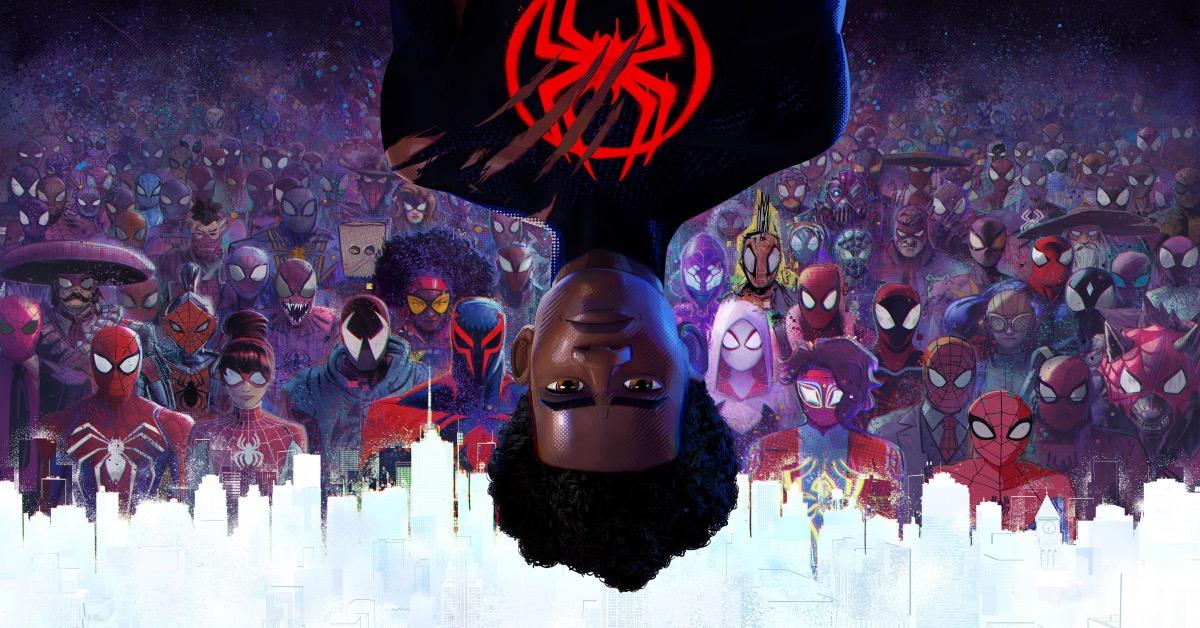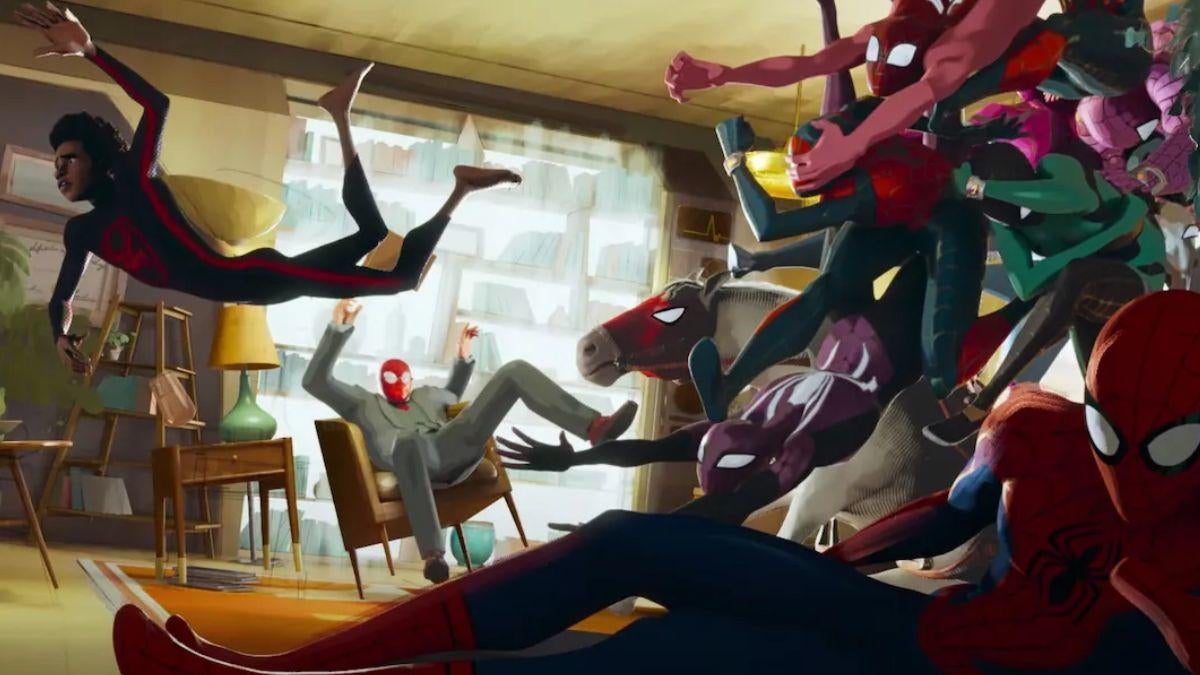Articles
Spider-Man: Across the Spider-Verse Review: An Epic and Stunning First Half
It seems wild, now, that Spider-Man: Into the Spider-Verse was a dark horse success story when it was released in 2018. Few fans knew what to make of an animated Spider-Man that wasn’t even focused on Peter Parker, and even fewer fans were prepared for Sony to take the Spider-Man franchise into the multiverse – a horizon that not even Marvel Studios or DC/Warner Bros. were daring to venture into at the time. By the time it was receiving Oscars, Spider-Man: Into the Spider-Verse had launched a new generation of Spider-People into the mainstream (Miles Morales/Spider-Man, Gwen Stacy/Spider-Woman), and set some of the loftiest expectations for a sequel there could be.
Spider-Man: Across the Spider-Verse arrives in theaters as one of the most highly-anticipated Spider-Man projects ever, and one of the most highly-anticipated films of the year. Thankfully, Sony, directorial trio Joaquim Dos Santos, Kemp Powers, and Justin K. Thompson, and an army of animators manage to deliver a Spider-Verse sequel that is a worthy successor to the original film – even if it’s only half the story. Across the Spider-Verse is also easily one of the most visually-stunning animated films ever made – so much so that it feels utterly disingenuous trying to quantify it all after just one viewing.

The story of Spider-Man: Across the Spider-Verse picks up months after the events of the first film. We discover (over the course of the movie) that everything surrounding Miles Morales’ (Shameik Moore) Spider-Man origin was bigger and more important to the multiverse than we thought – as are the tragedies connected to his role as the Wall-Crawler. Miles and a new portal-hopping villain called The Spot (Jason Schwartzman), end up attracting the attention of a Miguel O’Hara/Spider-Man 2099 (Oscar Isaac) and his team of Spider-Verse protectors – including Miles’ old buddies Gwen Stacy (Hailee Steinfeld) and Peter B. Parker (Jake Johnson). When the secrets that Miguel and co. are hiding start to come to light, Miles finds himself at an impasse with his Spider-Peers, kicking off a multi-dimensional fight that could determine the fate of any and everyone who wears the Spider-Man symbol.
As stated, Spider-Man: Across the Spider-Verse is nothing less than the most ambitious and visually-stunning Spider-Man story ever told onscreen – and it’s not even close. There are numerous shifts in animation style (and beyond that format) in order to distinguish the universes of the Spider-Verse as their own unique realities. Each animated style is so visually rich and dense with details that it is nearly impossible for the eye to even fully adjust to, let alone discern all of the gorgeous details and/or Easter eggs buried in each frame. In that way, Across the Spider-Verse is a film that is already front-loaded with the need to rewatch it, if only to fully appreciate the feat in visuals and design that it is.
Like the first film, the soundtrack is as much a part of the fabric of the film as the visuals. Returning composer Daniel Pemberton and hit producer Metro Boomin create a sonic mix that takes the hip-hop edge and heart-swell orchestrated numbers of the first Spider-Verse and layers in darker, haunting, sonic themes to reflect the more mature twists and turns the story takes. The same goes for the voice work: Across the Spider-Verse has its lineup of returning actors (Shameik Moore, Hailee Steinfeld, Oscar Isaac, Luna Lauren V?lez, Brian Tyree Henry) all doing more mature dramatic work as the characters struggle with deeper and much more complicated issues of the civilian/superhero divide. New additions like Daniel Kaluuya‘s (Get Out) Spider-Punk, Issa Rae‘s (Insecure) Jessica Drew/Spider-Woman, and Karan Soni‘s (Deadpool) Spider-Man India are all welcome additions, with Kaluuya being the scene-stealer MVP with his timing and vocal performance.
The hardest and most divisive part of Spider-Man: Across the Spider-Verse will no doubt be the story. Chris Miller and Phil Lord (21 Jump Street, The Lego Movie) are joined by David Callaham (Ant-Man, Wonder Woman 1984), in crafting what is, without a doubt, the biggest Spider-Man story ever told onscreen. To their credit, the trio is clearly hammering out a multi-faceted trilogy story that seems like it could be (by the time it’s finished) one the greatest Spider-Man stories told in any medium; one of the best comic book multiverse stories ever told; and one of the greatest franchise universe launches ever pulled off, because Across the Spider-Verse certainly helps further tee up any number of spinoffs Sony could pursue using various versions of the Spider-Man character.

That all said: the considerable drawback to Across the Spider-Verse is that this animated film and its forthcoming sequel (Beyond the Spider-Verse) were clearly designed as one massive story, and at this scale, with this many characters and arcs, it feels like only half a story. That criticism extends beyond the obvious “to be continued…” cliffhanger ending: Across the Spider-Verse has a massive lack of deeper resolution or character/thematic development. As such, it’s similarly hard to argue that Across the Spider-Verse has any real “point” as a standalone viewing experience. That’s a hard pill to swallow: Into the Spider-Verse was blessedly singular in its thematic and/or character focus (Miles Morales), making the emotional beats and character development so deeply impactful. Across the Spider-Verse spreading its focus to the wider tragedy of a Spider-Man or Spider-Woman’s existence is intriguing, but some of the heart that defined our first experience with Miles Morales, and made the character a mainstream breakthrough isn’t quite re-captured in this middle chapter.
But again: the scope and ambition of this larger Spider-Verse story – plus the clear indication that it could very well stick the landing (and then some) in Beyond the Spider-Verse – also makes it hard to criticize Spider-Man: Across the Spider-Verse too extensively. After all, the biggest drawback to the film is having to manage the eagerness to get to the next one. In a world where franchise universes rule, that’s still a big win.
Rating: 4.5 Out of 5 Stars
Spider-Man: Across the Spider-Verse is now playing in theaters.


